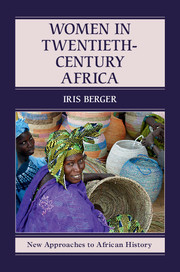Book contents
- Frontmatter
- Dedication
- Contents
- LIST OF ILLUSTRATIONS
- LIST OF MAPS
- PREFACE
- Map
- Introduction
- 1 Colonizing African families
- 2 Confrontation and adaptation
- 3 Domesticity and modernization
- 4 Mothers of nationalism
- 5 The struggle continues
- 6 “Messengers of a new design”: marriage, family, and sexuality
- 7 Women's rights: the second decolonization?
- 8 Empowerment and inequality in a new global age
- Contradictions and challenges
- REFERENCES AND FURTHER READING
- INDEX
4 - Mothers of nationalism
Published online by Cambridge University Press: 05 May 2016
- Frontmatter
- Dedication
- Contents
- LIST OF ILLUSTRATIONS
- LIST OF MAPS
- PREFACE
- Map
- Introduction
- 1 Colonizing African families
- 2 Confrontation and adaptation
- 3 Domesticity and modernization
- 4 Mothers of nationalism
- 5 The struggle continues
- 6 “Messengers of a new design”: marriage, family, and sexuality
- 7 Women's rights: the second decolonization?
- 8 Empowerment and inequality in a new global age
- Contradictions and challenges
- REFERENCES AND FURTHER READING
- INDEX
Summary
The year 1955 was a turning point for women in Tanzania. John Hatch, the British representative of the Labour government, visited Dar es Salaam in June to meet with members of the fledging nationalist movement, the Tanganyika African National Union (TANU), and to encourage them to press for independence without violence. After witnessing a speech that the group's leader Julius Nyerere gave to a crowd of 25,000 people, Hatch posed a question to the officials he met: “I see there were a lot of people at Nyerere's meeting today … but do you have a women's section … I want to meet their leader.” They promised a meeting the following day. But, in the words of Bibi Titi Mohamed, who would become the women's leader:
The truth is, they didn't have a woman then! … Everyone had locked their wives away [in the house]. Everyone refused. “Then what shall we do?” they asked themselves. Then Sheneda [one of the men] said, “I will go and collect Titi.” … her husband is my friend. I'll talk to him and she will come.
The following day she was taken to the TANU office and introduced to John Hatch as “leader of the women's section.” From then on, after TANU officials contacted her husband asking his written permission, Bibi Titi Mohamed became the head of the party's women's section. Adopting a pattern unique to Tanzania, she mobilized her followers through ngoma, women's dance groups, which united Swahili-speaking women from all over the country. As was common across the continent during the 1950s, in many of her speeches, she appealed to women as mothers, emphasizing the ability to give birth as the source of their power:
“I am telling you that we want independence. And we can't get independence if you don't want to join the party. We have given birth to all these men. Women are the power in this world. I am telling you that we have to join the party first.” So they went and joined the party.
Bibi Titi Mohamed was a young Muslim woman born in the coastal city of Dar es Salaam in 1926. In an interview with historian Susan Geiger, she explained that her father was a businessman and her mother a farmer and housewife.
- Type
- Chapter
- Information
- Women in Twentieth-Century Africa , pp. 66 - 88Publisher: Cambridge University PressPrint publication year: 2016



